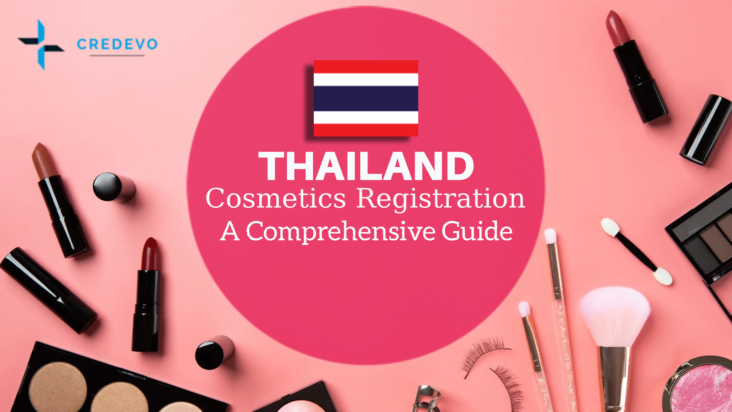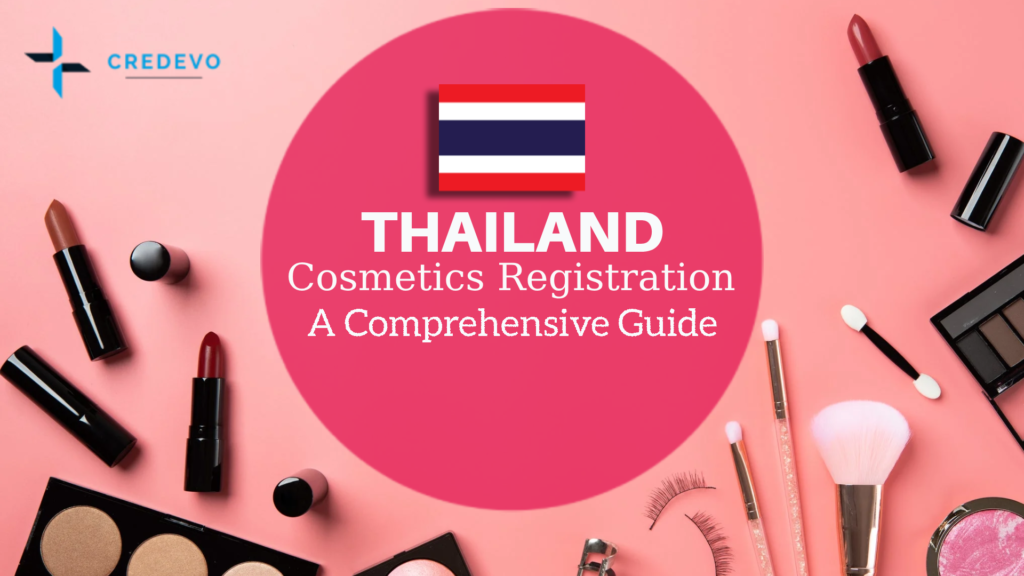Registration Of Cosmetics In Thailand: A Comprehensive Guide

Cosmetic product registration in Thailand has become faster and more environmentally friendly since November 1, 2010, when the Thai FDA adopted a new online cosmetic product registration system. Thailand’s cosmetics business is expanding, offering a wide range of beauty and personal care products.

Thailand established a comprehensive regulatory framework to ensure consumer safety while maintaining product quality. Therefore, before introducing products, manufacturers and importers must be aware of Thailand’s cosmetic regulatory system.
The Thailand cosmetics industry is anticipated to generate US$770.60 million in revenue by 2024, with an annual growth rate of 5.51% and a CAGR 2024-2028.
If one intends to introduce a cosmetic product into the Thailand market, the following five reasons can serve as compelling justifications:
Top 5 Reasons Why Thailand is an Ideal Market for Your Cosmetic Products
- Thai customers place a high value on physical appearance and personal hygiene, which makes Thailand’s cosmetics business especially popular.
- Thailand’s unique location in Southeast Asia makes it an important regional hub for business and trade.
- Growing disposable income, evolving consumer tastes, and the advent of social networking platforms are all driving up demand for cosmetics in Thailand.
- To encourage foreign investment, the Thai government has launched many initiatives, making it easier for companies in the nation to operate.
- Thailand has a robust infrastructure, highly skilled labor, and an extensive supplier network, making it an appealing destination for cosmetic manufacturers and distributors.
This article helps you understand the steps and requirements to register your cosmetic products in Thailand.
Regulatory Authority for Cosmetics in Thailand
- Thailand’s current cosmetics authority is the Thailand Food and Drug Administration (Thai FDA) which reports to the Ministry of Public Health (MOPH).
- The Minister of Public Health is responsible for developing and implementing cosmetic regulations, measures, and standards.
- The Food and Drug Administration concentrates on cosmetic notification and post-market surveillance.
- The Thai FDA comprises six departments: cosmetics, import and export inspection, pharmaceuticals, food, narcotics, and medical equipment.
- The Thai FDA complied with the ASEAN Cosmetic Directive (ACD) guidelines for cosmetic product registration, which are consistent with those of other ASEAN member countries. Cosmetic items marketed in Thailand must adhere to these guidelines.
Are you looking to register your cosmetics products in countries within the Asia-Pacific region, including Thailand? Click here to connect with us and speak with our expert team.
Definition of Cosmetics in Thailand
As per the Thai FDA, the definition of cosmetic is as follows:
A product that is considered a cosmetic must satisfy the definition under section 4 of the Cosmetics Act, B.E. 2558 (2015) which provides that a cosmetic means:
- An article intended to be used by applying to, rubbing on, massaging into, sprinkling on, spraying on, dropping on, putting on, perfuming, or any other means with external parts of the human body, including applying to teeth and mucous membranes in the oral cavity, for the purpose of cleaning, beautifying or changing their appearance, or preventing body odors, or protecting or maintaining the parts in good condition, including skincare products, but excluding ornaments and accessories used outside the body.
- An article intended to be used specifically as ingredients in the manufacture of cosmetics.
- Any other article is prescribed to be cosmetic by the Ministerial Regulation.
Regulatory requirements for cosmetics registration in Thailand
The technical requirements include ingredient listings, labeling and claims, pre-marketing regulations, and Good Manufacturing Practices (GMP). These technical criteria serve as guidance for quality and safety management.
- Documents proving the product is classified as a cosmetic.
- Supporting document of the cosmetic trade name and claims.
- Good Manufacturing Practice (GMP) Compliance: Evidence that the cosmetic product is manufactured in accordance with good manufacturing practices to ensure quality and safety.
- Document format: a Common Technical Document (CTD) or an Electronic Common Technical Document (eCTD).
- Letter of authorization.
- A notifying form that includes, Trade name and cosmetic names, Use of cosmetics, Types of cosmetics, Usage, Physical characteristics, etc.
- Label requirements.
- All cosmetic labels must include the following information:
- The cosmetic’s name and trade name.
- The manufacturer’s name and location if manufactured in the home country.
- The importer’s name and location, along with the manufacturer’s name and country of origin for imported cosmetics.
- The quantity, directions for use, cautions, warnings, month and year of manufacture, expiry date, batch number or letter, and names of all ingredients.
- Disclaimer of application.
Exemption: A person who manufactures or imports cosmetic samples for exhibition, promotional show, study, research, or laboratory analysis shall be exempt from the requirement to obtain a notification receipt.
License holder for cosmetics in Thailand
In Thailand, a license holder is required for cosmetics registration. The license holder must be a Thai national or a registered Thai company authorized to import cosmetics. This regulation ensures compliance with safety standards and facilitates accountability in the distribution and sale of cosmetics within the country.
The regulatory process for cosmetics registration in Thailand
Before commencing to manufacture or import a cosmetic for sale, a person who wishes to manufacture or accepts a contract to manufacture or import must inform the Thai FDA of the details of the cosmetic.
Step 1
A person (manufacturer, contract manufacturer, or importer) must apply for a facility inspection report before filing a notification.
Step 2
Upon accepting the application, the authority will examine the documents and, if found complete and correct, notify the result via a computer network to proceed with the notification step. If the inspection step fails, the applicant will need to resubmit the application to get it approved.
Step 3
Following facility clearance, individuals must file a notification application, and the notification includes the following details:
- Name and address of the applicant (manufacturing, import, or storage facility).
- Cosmetic information includes the product name, type, ingredients, and usage instructions.
- Under the laws governing cosmetic notice, the details must be notified using Form Jor. Kor. and associated papers.
Step 4
After receiving the notification receipt, the individual should manufacture or import the cosmetic product as specified in the notification.
Step 5
- Cosmetic manufacturers, importers, and subcontractors have to ensure that all cosmetics are labeled.
- A cosmetic label must be in Thai and accurately readable. Statements on the label must be open and truthful, within the limits of the cosmetic, and not generate any significant misconception about the product.
- Documentation or evidence must support the statements on the label.
Validity
The notification receipt is valid for three years and can be renewed six months before expiration.
Claims for cosmetics in Thailand
In Thailand, claims for cosmetics must comply with regulations set by the Thai Food and Drug Administration (FDA). Cosmetic claims should be truthful, not misleading, and supported by scientific evidence.
- It’s important for cosmetic manufacturers and distributors to ensure that their product claims comply with Thai FDA regulations to avoid potential penalties or product recalls.
- Additionally, the Thai FDA does not permit cosmetics to make any medicinal claims, such as those related to treating or preventing diseases. Such claims may instead require registration as a pharmaceutical product.
Fee for cosmetic products notification in Thailand
| Category | Fee |
|---|---|
| Notification receipt for the manufacture of cosmetics | 5,000 baht |
| Notification receipt for import of cosmetics | 5,000 baht |
| Notification receipt for subcontracting to manufacture for sale | 5,000 baht |
| Replacement notification receipt | 1,000 baht |
| Notification application | 500 baht |
| Request to modify notification receipt | 500 baht |
Post-Market Surveillance
After cosmetic items are launched in the market, the Thai FDA actively undertakes its supervisory and monitoring duty, focusing mostly on five major areas, notably:
- Constant Inspection
- Market surveillance
- Adverse product reaction monitoring
- Improvement of manufacture
Import after approval
- After receiving the notification receipt, the individual should import the cosmetic product as specified in the notification.
- Importers have to ensure that all cosmetics are labeled.
- All cosmetics must have Thai legal labeling within 30 days of importation before being sold.
- Statements on the label must be genuine, should fit within the scope of cosmetic standards, and should not generate any significant misunderstanding about the product.
Do you have any questions regarding registering your cosmetic products in Thailand?
Do you need any assistance with registering your cosmetic products in Thailand? Or do you require a license holder for your cosmetics products? Please provide your requirements details below, and we will be happy to assist you.